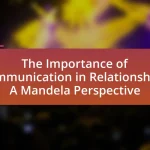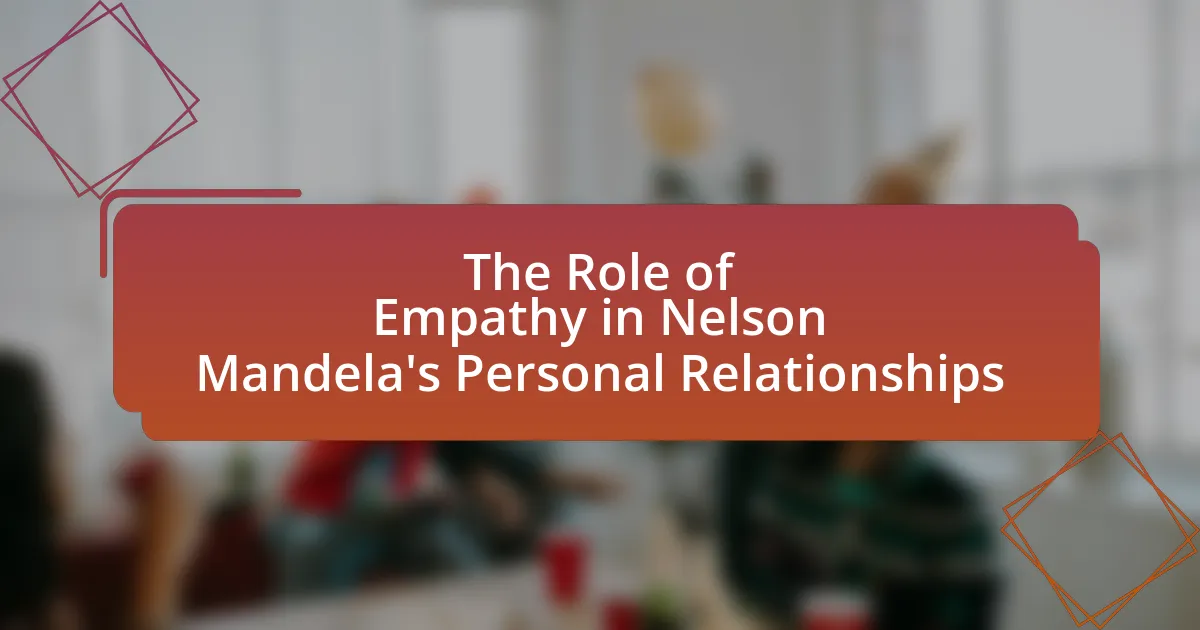Nelson Mandela’s approach to friendship and loyalty is defined by deep commitment, mutual respect, and the ability to forgive. He viewed true friendship as a bond built on trust and support, particularly during challenging times, and emphasized the importance of collective goals over personal interests. Mandela’s experiences, including his long imprisonment, shaped his understanding of loyalty, which he demonstrated through unwavering support for his comrades and principles of justice. The article explores how Mandela’s values influenced his leadership, the role of loyalty in the anti-apartheid movement, and the lessons that can be applied to modern relationships, highlighting practical strategies for fostering loyalty and friendship in various contexts.
What is Nelson Mandela’s Approach to Friendship and Loyalty?
Nelson Mandela’s approach to friendship and loyalty is characterized by deep commitment and mutual respect. He believed that true friendship is built on trust, understanding, and the willingness to support one another through challenges. Mandela’s relationships were often marked by his ability to forgive and reconcile, as seen in his efforts to unite a divided South Africa post-apartheid. His loyalty extended not only to friends but also to the principles of justice and equality, which he upheld throughout his life. This is evidenced by his long-standing relationships with fellow activists and leaders, where he prioritized collective goals over personal interests, demonstrating that loyalty to a cause can strengthen bonds of friendship.
How did Nelson Mandela define friendship?
Nelson Mandela defined friendship as a deep bond characterized by mutual respect, trust, and support. He believed that true friendship transcends differences and is built on the foundation of shared values and understanding. Mandela emphasized that friends should stand by each other in times of adversity, reflecting his own experiences of loyalty and solidarity during his struggle against apartheid. His relationships with fellow activists and leaders demonstrated this commitment, as he often highlighted the importance of collective effort and unity in achieving common goals.
What values did Mandela associate with true friendship?
Nelson Mandela associated true friendship with values such as loyalty, trust, and mutual respect. He believed that genuine friendships are built on a foundation of unwavering support and understanding, where friends stand by each other in times of adversity. Mandela’s own experiences, particularly during his imprisonment, highlighted the importance of loyalty, as he relied on the steadfastness of his friends and allies to sustain his spirit and commitment to justice. His relationships exemplified how true friendship involves a deep sense of responsibility towards one another, fostering a bond that transcends personal interests for the greater good.
How did Mandela’s experiences shape his view on friendship?
Nelson Mandela’s experiences profoundly shaped his view on friendship, emphasizing loyalty, trust, and mutual support. During his 27 years of imprisonment, Mandela formed deep bonds with fellow inmates, which highlighted the importance of solidarity in adversity. His relationships with leaders like Oliver Tambo and Walter Sisulu demonstrated that friendship is rooted in shared values and struggles. Mandela’s commitment to reconciliation post-apartheid further illustrated his belief that true friendship transcends past grievances, fostering unity and collective progress. These experiences collectively reinforced his understanding that genuine friendships are built on respect, understanding, and a shared vision for a better future.
What role did loyalty play in Mandela’s relationships?
Loyalty was a fundamental aspect of Nelson Mandela’s relationships, shaping his connections with allies, family, and the broader community. Mandela’s unwavering loyalty to his comrades in the African National Congress (ANC) fostered a strong sense of unity and purpose during the anti-apartheid struggle, exemplified by his commitment to collective leadership and shared goals. His loyalty extended to personal relationships, where he valued trust and support, as seen in his enduring bond with figures like Oliver Tambo, which was crucial for maintaining solidarity in their fight against oppression. Furthermore, Mandela’s loyalty to his principles of justice and equality guided his interactions, reinforcing his reputation as a trustworthy leader who prioritized the well-being of his people over personal gain.
How did Mandela demonstrate loyalty to his friends and allies?
Nelson Mandela demonstrated loyalty to his friends and allies by consistently advocating for their rights and supporting their struggles against apartheid. He maintained close relationships with fellow activists, such as Walter Sisulu and Oliver Tambo, even during his imprisonment, showing unwavering commitment to their shared goals. Mandela’s loyalty was evident when he prioritized collective leadership and unity within the African National Congress, ensuring that his allies were included in decision-making processes. His actions during negotiations for a democratic South Africa further illustrated this loyalty, as he worked to secure positions for his allies in the new government, emphasizing the importance of collaboration and mutual support in achieving their common objectives.
What were the consequences of loyalty in Mandela’s life?
Loyalty in Nelson Mandela’s life led to both personal sacrifices and significant political consequences. His unwavering loyalty to the anti-apartheid movement resulted in his imprisonment for 27 years, demonstrating the personal cost of his commitment to justice and equality. This loyalty also fostered deep connections with fellow activists, which strengthened the resistance against apartheid and ultimately contributed to the dismantling of the oppressive regime in South Africa. Mandela’s loyalty to his principles and comrades was pivotal in uniting diverse groups within the struggle, showcasing how loyalty can drive collective action and change.
How did Mandela’s approach to friendship and loyalty influence his leadership?
Nelson Mandela’s approach to friendship and loyalty significantly influenced his leadership by fostering trust and collaboration among diverse groups. His emphasis on building personal relationships allowed him to unite people across racial and political divides, which was crucial during South Africa’s transition from apartheid. For instance, Mandela’s friendships with leaders like Desmond Tutu and F.W. de Klerk exemplified his commitment to reconciliation, enabling constructive dialogue and cooperation. This approach not only strengthened his leadership but also facilitated the establishment of a democratic society, as evidenced by the peaceful negotiations that led to the end of apartheid in the early 1990s.
What impact did his friendships have on his political strategies?
Nelson Mandela’s friendships significantly influenced his political strategies by fostering alliances that strengthened his anti-apartheid efforts. These relationships provided him with critical support, resources, and a broader platform to advocate for change. For instance, Mandela’s close ties with leaders like Oliver Tambo and Walter Sisulu facilitated international advocacy and mobilization against apartheid, enhancing the African National Congress’s (ANC) visibility and legitimacy. Additionally, his friendships with global figures, such as U.S. President Bill Clinton and British Prime Minister Tony Blair, helped garner international pressure on the South African government, ultimately contributing to the dismantling of apartheid.
How did loyalty among his supporters affect the anti-apartheid movement?
Loyalty among Nelson Mandela’s supporters significantly strengthened the anti-apartheid movement by fostering unity and resilience against oppressive policies. This unwavering commitment enabled organized resistance, exemplified by mass protests and international advocacy, which pressured the South African government. For instance, the formation of the African National Congress (ANC) and its alliances with various groups showcased how loyal supporters mobilized resources and maintained momentum despite severe repression. The loyalty of supporters also facilitated Mandela’s release from prison in 1990, as sustained activism kept global attention on apartheid, ultimately leading to negotiations for a democratic South Africa.
What lessons can we learn from Mandela’s approach to friendship and loyalty?
Nelson Mandela’s approach to friendship and loyalty teaches the importance of steadfastness and mutual respect in relationships. Mandela demonstrated unwavering loyalty to his friends and allies, even during his 27 years of imprisonment, which reinforced the value of standing by those who share common goals and values. His relationships with figures like Oliver Tambo and Walter Sisulu exemplified how collaboration and trust can lead to collective strength in the face of adversity. Furthermore, Mandela’s ability to forgive former adversaries, such as F.W. de Klerk, highlights the lesson that loyalty can also involve reconciliation and understanding, fostering unity rather than division. These principles underscore that true friendship is built on integrity, support, and the willingness to embrace differences for a greater cause.
How can Mandela’s principles be applied in modern relationships?
Mandela’s principles can be applied in modern relationships by emphasizing forgiveness, respect, and open communication. These principles foster trust and understanding, which are essential for healthy relationships. For instance, Mandela’s commitment to reconciliation after years of conflict illustrates the power of forgiveness in healing relationships. Additionally, his belief in the importance of listening to others promotes respectful dialogue, allowing individuals to express their feelings and perspectives. This approach can lead to stronger bonds and conflict resolution in contemporary relationships.
What are practical ways to cultivate loyalty in friendships?
To cultivate loyalty in friendships, consistently demonstrate trustworthiness and support. Trustworthiness can be established by keeping promises and being reliable, which fosters a sense of security in the relationship. Supporting friends during challenging times reinforces loyalty, as it shows commitment and care. Additionally, open communication is essential; discussing feelings and concerns helps to build a deeper understanding and connection. Research indicates that friendships characterized by mutual support and trust lead to stronger bonds, as highlighted in studies on social relationships by researchers such as Julianne Holt-Lunstad, which emphasize the importance of social support in maintaining close friendships.
How can we embody Mandela’s values in our daily interactions?
We can embody Mandela’s values in our daily interactions by practicing empathy, respect, and forgiveness. Mandela emphasized the importance of understanding others’ perspectives and treating everyone with dignity, regardless of their background. For instance, he famously stated, “What counts in life is not the mere fact that we have lived. It is what difference we have made to the lives of others that will determine the significance of the life we lead.” This principle can be applied by actively listening to others, valuing their opinions, and resolving conflicts through dialogue rather than hostility. By fostering an environment of mutual respect and understanding, we can reflect Mandela’s commitment to friendship and loyalty in our everyday relationships.
What challenges did Mandela face in maintaining friendships and loyalty?
Nelson Mandela faced significant challenges in maintaining friendships and loyalty due to his long imprisonment and the political climate of apartheid South Africa. His incarceration for 27 years created physical separation from friends and allies, complicating personal relationships. Additionally, Mandela’s leadership role in the African National Congress (ANC) required him to make difficult decisions that sometimes alienated former friends who disagreed with his strategies or compromises. For instance, his decision to negotiate with the apartheid government in the early 1990s was met with criticism from some within the ANC, leading to tensions in his relationships. Furthermore, the shifting political landscape often forced Mandela to prioritize loyalty to the broader struggle against apartheid over individual friendships, which strained personal connections.
How did political pressures affect his personal relationships?
Political pressures significantly strained Nelson Mandela’s personal relationships, particularly during his imprisonment and political activism. His commitment to the anti-apartheid struggle often required him to prioritize political alliances over personal connections, leading to feelings of isolation among friends and family. For instance, Mandela’s long incarceration from 1962 to 1990 meant he was physically separated from loved ones, which created emotional distance and challenges in maintaining those relationships. Additionally, his political role necessitated difficult decisions that sometimes alienated allies who disagreed with his strategies, such as the shift towards negotiations with the apartheid government in the late 1980s. These dynamics illustrate how the demands of political life can overshadow personal ties, impacting the depth and quality of relationships.
What strategies did Mandela use to overcome these challenges?
Nelson Mandela employed several strategies to overcome challenges, including fostering dialogue, building coalitions, and promoting reconciliation. He prioritized communication with adversaries, which facilitated understanding and reduced tensions, exemplified by his negotiations with the apartheid government. Mandela also formed alliances with various political groups and international leaders, strengthening his position and support base. His commitment to reconciliation was evident in his establishment of the Truth and Reconciliation Commission, aimed at healing the nation and addressing past injustices. These strategies collectively contributed to his success in navigating the complexities of South Africa’s political landscape.

How can we foster a culture of friendship and loyalty inspired by Mandela?
To foster a culture of friendship and loyalty inspired by Mandela, individuals and communities should prioritize empathy, open communication, and mutual respect. Mandela exemplified these values through his commitment to reconciliation and understanding, as seen in his efforts to unite a divided South Africa post-apartheid. By encouraging dialogue and collaboration among diverse groups, as Mandela did during the Truth and Reconciliation Commission, societies can build trust and strengthen bonds. Furthermore, promoting acts of kindness and support within communities can reinforce loyalty, reflecting Mandela’s belief in the power of collective action for a common good.
What initiatives can promote friendship and loyalty in communities?
Initiatives that can promote friendship and loyalty in communities include community service projects, cultural exchange programs, and local mentorship schemes. Community service projects foster collaboration and shared goals, which strengthen bonds among participants. Cultural exchange programs encourage understanding and appreciation of diverse backgrounds, enhancing interpersonal relationships. Local mentorship schemes create supportive networks where individuals can build trust and loyalty through guidance and shared experiences. These initiatives have been shown to improve social cohesion and community resilience, as evidenced by studies indicating that engaged communities experience lower crime rates and higher levels of trust among residents.
How can educational programs incorporate Mandela’s values?
Educational programs can incorporate Mandela’s values by integrating principles of equality, respect, and social justice into their curricula. These programs can include lessons on Mandela’s life, emphasizing his commitment to reconciliation and community building, which can foster a sense of loyalty and friendship among students. For instance, discussions on Mandela’s efforts to dismantle apartheid can illustrate the importance of standing against injustice and promoting inclusivity. Additionally, service-learning projects that encourage students to engage with their communities can reflect Mandela’s belief in the power of collective action and mutual support.
What role can leaders play in encouraging loyalty among team members?
Leaders can foster loyalty among team members by demonstrating trust, respect, and support. When leaders actively listen to their team, acknowledge individual contributions, and provide opportunities for professional growth, they create an environment where team members feel valued. Research indicates that organizations with high levels of employee engagement, often driven by supportive leadership, experience 21% greater profitability and 17% higher productivity. This correlation underscores the importance of leaders in cultivating loyalty through positive relationships and a strong team culture.
What are some best practices for building strong friendships and loyalty?
To build strong friendships and loyalty, prioritize open communication, trust, and mutual respect. Open communication fosters understanding and connection, while trust is essential for deepening relationships. Mutual respect ensures that both parties value each other’s perspectives and boundaries. Research indicates that friendships built on these principles are more resilient; for instance, a study published in the Journal of Social and Personal Relationships found that trust significantly predicts relationship satisfaction. Additionally, engaging in shared experiences and supporting each other during challenging times further solidifies these bonds, as evidenced by findings from the American Psychological Association, which highlight the importance of emotional support in maintaining long-term friendships.
How can we effectively communicate to strengthen bonds?
Effective communication to strengthen bonds involves active listening, empathy, and open dialogue. Active listening ensures that individuals feel heard and valued, fostering trust and connection. Empathy allows for understanding and validation of feelings, which deepens relationships. Open dialogue encourages transparency and honesty, essential for resolving conflicts and building mutual respect. Research indicates that effective communication skills are linked to stronger interpersonal relationships, as highlighted in studies by the American Psychological Association, which emphasize the role of communication in relationship satisfaction.
What actions can reinforce loyalty in both personal and professional relationships?
Actions that can reinforce loyalty in both personal and professional relationships include consistent communication, trust-building behaviors, and mutual respect. Consistent communication fosters transparency and understanding, which are essential for maintaining strong connections. Trust-building behaviors, such as keeping promises and being reliable, create a foundation of dependability that enhances loyalty. Mutual respect, demonstrated through valuing each other’s opinions and contributions, strengthens the bond between individuals. Research indicates that these elements are critical in both personal and professional contexts, as they lead to increased satisfaction and commitment in relationships.




